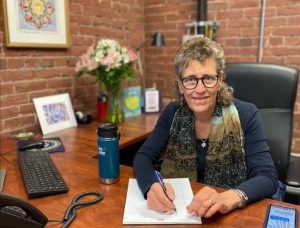
Pennsylvania founder and namesake William Penn established the colony — before it became the City of Brotherly Love — in the name of religious freedom.
Yet by the 21st century, New York, Washington, D.C., and Los Angeles had all established interfaith centers, but Philadelphia had not.
In the early aughts, Abby Stamelman Hocky, associate executive director of the Jewish Community Relations Council of Philadelphia at the time, traveled to New York to visit James Morton, founder of the Interfaith Movement of New York, alongside Rev. Richard Fernandez, who was then the leader of the more localized Neighborhood Interfaith Movement in Northwest Philadelphia. It was in New York that she made that realization.
“It all of a sudden opened our eyes to the fact that there were these interfaith centers in major cities around the country and around the globe,” Stamelman Hocky said. “And why here, in the birthplace of America and religious freedom, wasn’t there something like that?”
Stamelman Hocky sought to change that. In January 2004, she helped found the Interfaith Center of Greater Philadelphia, which later became Interfaith Philadelphia.
Today, Interfaith Philadelphia continues its mission to “promote social harmony and inter-religious understanding” through a series of partnerships offering certificates on faith and social impact and interfaith leadership with the University of Pennsylvania’s Center for Social Impact Strategy and Interfaith America, respectively.
The organization has worked with seminaries and religious organizations to build relationships and promote interreligious education and dialogue. Since its inception, Interfaith Philadelphia has offered a youth program to build leadership skills with middle schools, high schools and colleges. The program has worked with 1,000 youth over 19 years.
“It’s really shaped the career paths, the college experience and confidence that young people have in going into this time, with knowing how to really respect and appreciate people across all kinds of differences,” Stamelman Hocky said.
Stamelman Hocky, 66, like the youth Interfaith Philadelphia works with, benefited from an early introduction into community organizing. After receiving her bachelor’s degree in sociology from Lafayette College, Stamelman Hocky attended Wurzweiler School of Social Work at Yeshiva University in New York for her Master of Social Work degree. She’s also involved in the local Jewish community as a member of both Congregation Beth Am Israel and Or Zarua.
When she arrived at the JCRC in 1980, she felt well-prepared to work for the organization.
“It was really a proud way to serve the community from my Jewish identity and my Jewish professionalism, to work with the broader community,” Stamelman Hocky said. “And that’s only prepared me for the kind of change and vision that I saw was possible in Philadelphia.”
In the two decades with JCRC, Stamelman Hocky had always had an interest in interreligious relations. In working with so many faith organizations in the Philadelphia area, she became well acquainted with the power of religion in conversations around social values and social justice.
“There’s something very, very powerful in people inspired by the deep wells of their faith, however they define spirituality in their lives or however they orient around religion,” she said.
Stamelman Hocky founded Interfaith Philadelphia at a time when magnifying the power of religious values and forging deep interreligious connections was more tenuous.
Still, soon after 9/11, 2004 was marked by continued religious prejudice, especially toward the Muslim community. In Interfaith Philadelphia’s early days, the organization was focused on “prejudice reduction.”
People of other faith groups were not familiar with Muslim practices or didn’t know about how the Holocaust continued to impact the Jewish community. Step one of Interfaith Philadelphia’s work was getting people to understand their differences and not see them as threats or detriments.
“The kind of classic dialogue work that goes into meeting your neighbors and such was a lot of the fabric of the context in which we were living,” Stamelman Hocky said.
Today, Interfaith Philadelphia is working on building “civil conversation,” a dialogue among faith groups that aims to go beyond religious tolerance to celebrate religious differences and understand how religious diversity can enhance one’s faith identity and connection to a wider community.
“The world has become so much more aware that multiculturalism and multiracial relations and interfaith relations are all part of a spectrum of diversity, that we like to feel is kind of the new pluralism that our founders here really envisioned but could never have imagined,” Stamelman Hocky said.
Stamelman Hocky knows that the work of building meaningful interfaith connections extends beyond herself and Interfaith Philadelphia. As she thinks about the future of interreligious relations in Philadelphia, there’s a core question she asks: “What does it look like to create a rich and multicultural society?”






